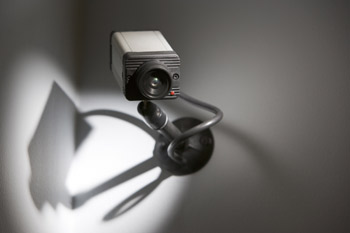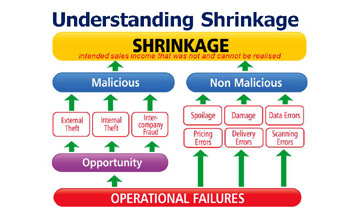A loss maker

Doing an honest day’s work doesn't mean all your customers will reward you with the same virtue. Some are lining their pockets while your profits are diminishing.
19 April 2011
 Shrinkage is a fact of life in the retail trade and something that needs to be factored into your business. Unfortunately as the recession has dragged on, levels of internal and external theft have greatly increased. ShelfLife carried out an online survey and found that shrinkage levels have increased steeply as the economy slides deeper into debt. According to our survey, 79% believe that shrinkage levels have increased over the past year and 45% believe that internal theft has increased.
Shrinkage is a fact of life in the retail trade and something that needs to be factored into your business. Unfortunately as the recession has dragged on, levels of internal and external theft have greatly increased. ShelfLife carried out an online survey and found that shrinkage levels have increased steeply as the economy slides deeper into debt. According to our survey, 79% believe that shrinkage levels have increased over the past year and 45% believe that internal theft has increased.
Why is shrinkage increasing?
When we questioned the retailers about why they thought that shrinkage had increased many blamed the dwindling economic fortunes of their customers, the inability of the authorities to deal with petty theft and sheer opportunism.
“Gardaí are reluctant to deal with this problem and the courts will not punish persistant offenders”
“People are becoming desperate”
“High debts and no jobs”
“Current economic climate, (people are) more willing to take the risk and not overly concerned about consequences”
“Competition from multiples, below cost selling, reduced spending power of customers”
“I don’t think my customers plan to steal before a visit. I have updated my CCTV which is a deterrent. I have stock control procedures in place.”
“The recession!”
“Because times are getting harder for people and they have less money in their pocket”
“There is no doubt but the fact that people have less to spend they feel that they are almost entitled to steal goods from the retailers.”
“People are earning less”
“People are so broke they’re willing to take a chance”
“In general overall food shrinkage has decreased in my store. We find a lot of grab and runs in the off-licence”
“More people willing to pay for stolen products. Shortage of cash so some based on need”
“Prior to recession people could get a loan”
“Increased pressure on low income families has increased shrinkage on grocery food products somewhat but the real increase has been on cash theft and scams ie stolen cheques and theft of customers while in store doing their shopping”
 Top 10 products most likely to be stolen according to retailers in ShelfLife’s Shrinkage Survey
Top 10 products most likely to be stolen according to retailers in ShelfLife’s Shrinkage Survey
1 Confectionery
2 Alcohol
3 Cosmetics
4 Household
5 Razors
6 Baby products
7 Soft drinks
8 Fuel
9 Magazines
10 Bacon and sausages
Retailers said that staff were most likely to steal alcohol, cigarettes and deli products.
Dealing with shrinkage in Dublin’s city centre
An assistant manager at a Dublin city centre supermarket tells ShelfLife about the daily challenges they face trying to stave off petty theft
Dublin city centre is a tough environment for retailers. This employee (who didn’t want to be named) told us of how, children as young as seven had to be barred from entering the store where he worked because of the amount of product they were stealing. “One little boy in particular would just come into the shop a few times a day and take whatever he wanted. No matter how many times we caught him, he would just keep coming back. Appealing to his parents would have been pointless as the guards told us that his mother was regularly up for shoplifting. He had also been expelled from school! On another occasion, our security guard had detained a young man who had tried to walk out of the store with several bottles of wine. When gardaí arrived, the man started chewing at his hand, in what we thought was a nervous reaction. Next thing, he spits his own flesh and blood into the garda’s face – he wasn’t nervous at all but had been chewing his own flesh. That’s the kind of animalistic behaviour retailers and gardaí have to contend with in Dublin’s city centre!”
The retail consultant’s perspective
Joe Comerford, director of Solution Management Associates has seen an increase in shrinkage in line with the economic woes of the country.
“As the recession continues to bite, theft from shops is most definitely on the increase. According to gardaí sources, there were 14,889 thefts from shops offences reported to gardaí in 2004. In 2008, this figure was 20,102. 2010 showed a further increase. It’s worth remembering that 3% of the population are habitual thieves while 7% are opportunists”.
According to Comerford, the main reasons that people steal are greed to fund lifestyle; peer pressure (family, friends and ethnic groups); a culture to cheat; a lax attitude by owners and poor practices and procedures. “Often times people don’t even see it as stealing, to them it’s just a packet of cigarettes. That is why it is so important to give staff a tangible example such as – 11 packets of cigarettes would have to be sold to make up for the theft of just one!”, he explains.
“Grazing is another issue that many staff regard as harmless but that bar of chocolate or doughnut ends up costing the owner serious money over the course of the year. Again it’s all back to having the right procedures in place and making sure they are implemented. Stock loss won’t disappear but it can be managed!” says Comerford.
The importance of updating your security systems
David O’Brien, MD of CashGuard in Dublin explains how retailers can prevent internal shrinkage with the use of new security tills.
How can your product/s help decrease shrinkage?
CashGuard is a closed cash management and security system that integrates into a store’s existing POS system. We replace the cash register drawer with a note and coin recycler that manages the store’s cash into and out of the till automatically so that there is no access to the till drawers. All cash transactions including emptying are administered by CashGuard, eradicating theft and mistakes. Operations, floats and balances are monitored and reported by CashGuard.
What’s the approximate cost of installing this product?
Depending on the store configuration CashGuard costs between €9,000 and €11,000 per till. With this in mind, its important to stress that CashGuard pays for itself. CashGuard removes the requirement to organise till floats at the start of every shift, removes the need to count money, removes the need for reconciliations at the end of day as these are all managed by CashGuard after installation. The return on investment for CashGuard is between 12 and 15 months. This does not account for the savings a store gains through the eradication of theft and mistakes, which make the ROI even shorter.
In your experience, have retailers been suffering more from shrinkage in the past year?
Whilst CashGuard has been in operation throughout Scandanavia since 1994, we have only been promoting it in Ireland for the last six months. In that time we have seen a lot of interest from retailers in the benefits that it provides. Whilst retailers are reluctant to give details of shrinkage in their own stores, we can see that there is interest in CashGuard from the point of view of the removal of shrinkage at the cash register.
 Checklist to minimise shrinkage
Checklist to minimise shrinkage
According to the experts, up to 70% of all shrinkage in the trade can be sourced back to staff, either through poor practices and procedures (including back door) in the store’s daily operation or by direct stealing of product or cash.
It is very important for a store owner to know what his shrink percentage is. If a store trading at €40,000 per week was to record a 1% stock loss through shrinkage this would equate to a bottom line loss of €20,000 per annum.
- Your Epos system is one of the key tools used to control shrinkage. If operated in conjunction with regular (minimum quarterly) stock-takes, Epos will give you an on-the-spot assessment of how the business is performing.
- When you hire a new member of staff make sure that they are fully aware of all the security systems that are in place in your store. Show them the CCTV system, how the tills are reconciled, stocktaking systems and let them know that spot checks can take place at any time. If your staff know that you are on top of this they will be very unlikely to try and steal from you.
- Particular attention should be paid to staff working at the tills. Too many voids, refunds, shorts or overs may well indicate a problem. Watch to see if a pattern emerges and take action immediately.
- Ensure that there is a strict control procedure for issuing voids or refunds, which should only be transacted, by a manager or supervisor.
- Remember too that it’s not only the junior staff that can be guilty of pilferage so make sure your manager is towing the line too.
- Apart from being the consumer’s right it is important from a shrinkage control point of view that all customers are issued a receipt. This will limit the possibility of short-changing or under ringing.
- Make sure you have a “high value” stock control procedure in place. Sales of lotto and phone top-ups should be balanced daily with sales through the tills to ensure that there are no discrepancies. Each operator should be given a separate code for the operation of such machines so that sales can be reconciled against the various passwords.
- No cashier should be allowed balance up their own till at the end of their shift.
- Retailers should also have a policy for staff discounts if they exist and for serving relatives.
- Make sure that a weekly balance is done by the cash office. Someone who is not involved in the daily balancing of the tills should do this. A weekly balance should include – bank lodgements, store sales for that week, full safe check and a full balance of mobile phone top-ups, lottery cards, bus tickets etc.



 Print
Print





Fans 0
Followers